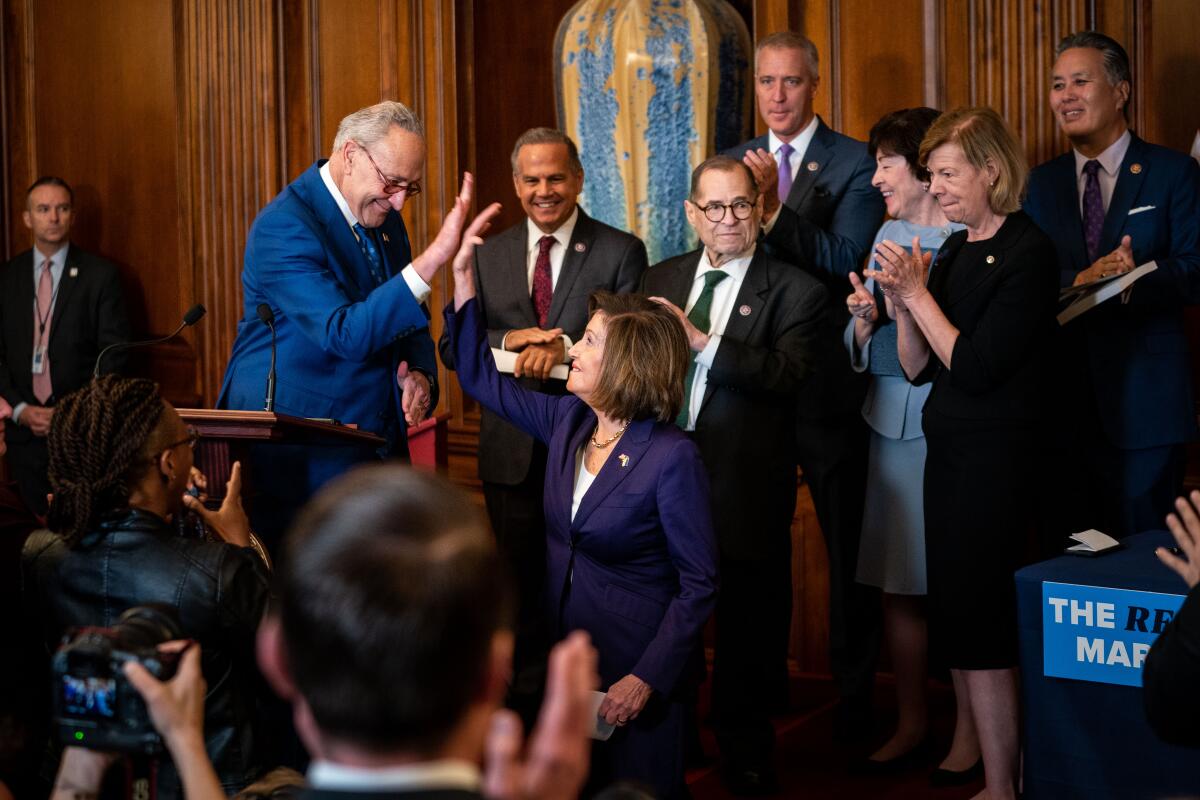Bill protecting same-sex and interracial unions clears Congress

- Share via
WASHINGTON — The House gave final approval Thursday to legislation protecting same-sex marriages, a monumental step in a decades-long battle for nationwide recognition of such unions that reflects a stunning turnaround in societal attitudes.
President Biden is expected to promptly sign the measure, which requires all states to recognize same-sex marriages — a relief for hundreds of thousands of couples who have married since the Supreme Court’s 2015 decision that legalized those marriages nationwide.
For the record:
4:33 p.m. Dec. 8, 2022An earlier version of this article incorrectly said the mass shooting at a gay nightclub in Colorado took place earlier this month. The shooting began shortly before midnight on Nov. 19.
In a statement after the vote, Biden called the legislation a “critical step to ensure that Americans have the right to marry the person they love.”
He said the legislation provides “hope and dignity to millions of young people across this country who can grow up knowing that their government will recognize and respect the families they build.”
The bipartisan legislation, which the House passed 258 to 169, with 39 Republican votes, would also protect interracial unions by requiring states to recognize legal marriages regardless of “sex, race, ethnicity, or national origin.”
The Senate passed the bill last week with 12 Republican votes after months of negotiations.
Democrats moved the bill quickly through the House and Senate after the Supreme Court’s decision in June that overturned the federal right to an abortion — including a concurring opinion from Justice Clarence Thomas that suggested the 2015 Obergefell vs. Hodges decision legalizing same-sex marriage could also be reconsidered.
Although many Republicans predicted that was unlikely to happen and said the bill was unnecessary, Democrats and GOP supporters of the bill said it shouldn’t be left to chance.
“We need it,” said House Speaker Nancy Pelosi (D-San Francisco), who presided over the vote as one of her last acts in leadership before she steps aside in January. “It is magic.”
The bill is “a glorious triumph of love and freedom,” she said, tearing up as she celebrated its passage.
The legislation requires states to recognize legal marriages regardless of ‘sex, race, ethnicity, or national origin.’
In debate ahead of the vote, several gay members of Congress talked about what it would mean for them and their families. Rep. Chris Pappas (D-N.H.) said he was set to marry “the love of [his] life” next year and that it was “unthinkable” that his marriage might not be recognized in some states.
Rep. Mark Pocan (D-Wis.) said that he and his husband should be able to visit each other in the hospital just like any other married couple, and that people should receive spousal benefits “regardless of if your spouse’s name is Samuel or Samantha.”
Rep. David Cicilline (D-R.I.) said that while the idea of marriage equality used to be a “far-fetched idea, now it’s the law of the land and supported by the vast majority of Americans.”
Although the bill received GOP votes, most Republicans opposed the legislation, and some conservative advocacy groups lobbied aggressively against it, arguing that it doesn’t do enough to protect those who want to refuse services to same-sex couples.
“God’s perfect design is indeed marriage between one man and one woman for life,” said Rep. Bob Good (R-Va.). “And it doesn’t matter what you think or what I think. That’s what the Bible says.”
Rep. Vicky Hartzler (R-Mo.) choked up as she begged colleagues to vote against the bill, which she said undermines “natural marriage” between a man and a woman.
“I’ll tell you my priorities,” Hartzler said. “Protect religious liberty, protect people of faith and protect Americans who believe in the true meaning of marriage.”
The Senate advanced a landmark bill to legalize same-sex marriage nationwide and codify some protections of the 2015 Supreme Court ruling.
The legislation would not require states to allow same-sex couples to marry, as the Obergefell vs. Hodges decision now does. But it would require states to recognize all marriages that were legal where they were performed, and it would protect current same-sex unions if the Obergefell decision were to be overturned.
Although it’s not everything advocates may have wanted, passage of the legislation represents a watershed moment. Just a decade ago, many Republicans openly campaigned on blocking same-sex marriages, which more than two-thirds of the public now support.
Democrats in the Senate, led by Wisconsin’s Tammy Baldwin and Arizona’s Kyrsten Sinema, slowly won over key Republican votes by negotiating an amendment that would clarify that the legislation does not affect the rights of private individuals or businesses that are already enshrined in current law.
The amended bill would also make clear that a marriage is between two people, an effort to ward off some far-right criticism that the legislation could endorse polygamy.
In the end, several religious groups, including the Church of Jesus Christ of Latter-day Saints, came out in support of the bill. The Mormon church said it would support rights for same-sex couples as long as they didn’t infringe on religious groups’ right to believe as they choose.
Conservative groups that opposed the bill pushed the almost four dozen Republicans who previously backed the legislation to switch their position. The Republicans who supported the bill in July represented a wide range of the GOP caucus — including more moderate members as well as Pennsylvania Rep. Scott Perry, chair of the hard-right House Freedom Caucus, and New York Rep. Elise Stefanik, the No. 3 House Republican.
House GOP leader Kevin McCarthy of Bakersfield voted against the measure.
Thursday’s vote came as the LGBTQ community has faced violent attacks, including the shooting last month at a gay nightclub in Colorado that killed five people and injured at least 17.
“We have been through a lot,” said Kelley Robinson, the incoming president of the advocacy group Human Rights Campaign. But Robinson says the votes show “in such an important way” that the country values LBGTQ people.
“We are part of the full story of what it means to be an American,” said Robinson, who was inside the Senate chamber for last week’s vote with her wife, Becky George, and young son. “It really speaks to them validating our love.”
The vote was personal for many senators, too. The day the bill passed their chamber, Senate Majority Leader Charles E. Schumer (D-N.Y.) was wearing the tie he wore when his daughter married her female partner. He recalled that day as “one of the happiest moments” of his life.
Baldwin, who was the first out gay senator and has been working on gay rights issues for almost four decades, tearfully hugged Schumer as the final vote was underway. She tweeted thanks to the same-sex and interracial couples who she said made the moment possible.
“By living as your true selves,” she wrote, “you changed the hearts and minds of people around you.”
More to Read
Get the L.A. Times Politics newsletter
Deeply reported insights into legislation, politics and policy from Sacramento, Washington and beyond. In your inbox three times per week.
You may occasionally receive promotional content from the Los Angeles Times.












